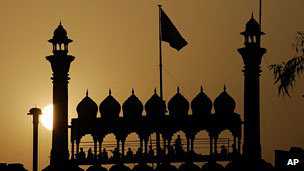According to BBC News’ Five things you didn’t know about Delhi, in the 1670s, Delhi briefly overtook Constantinople (now known as Istanbul) as the world’s largest conurbation.
Here is the related part of the article on BBC :

As Delhi celebrates 100 years as a capital, author Sam Miller supplies a few snippets of fact and trivia about the city that may have escaped you.
PROBABLY ONCE THE MOST POPULOUS CITY
In the 1670s, under the rule of the Mughal Emperor Aurangzeb, Delhi briefly overtook Constantinople (now known as Istanbul) as the world’s largest conurbation – according to the venerable urban statistician Tertius Chandler.
Red Fort Delhi flourished during Mughal rule
Delhi, by this time, was already full of the ruins of past empires still visible on the streets of the modern city.
The sudden new growth in population was caused by Aurangzeb’s father, Shah Jahan, who built a new capital just north of the ruins. The new city was named Shahjahanabad after him – and is now known as Old Delhi.
Delhi began to shrink again as the Mughal Empire gradually disintegrated, and Constantinople was restored to its position as the most populous city in the world.
According to 2011 estimates by Demographia, Delhi is now the second largest urban area in the world, behind Tokyo, while Istanbul trails far behind in 19th position.
via BBC News – Five things you didn’t know about Delhi.